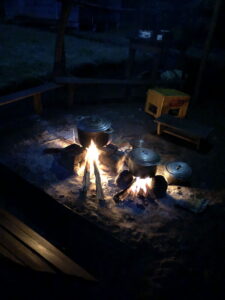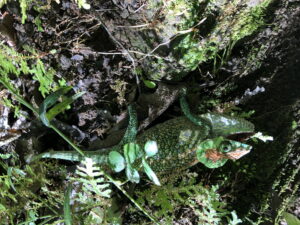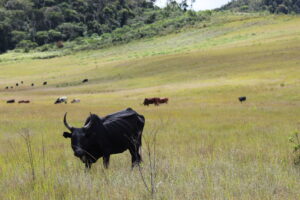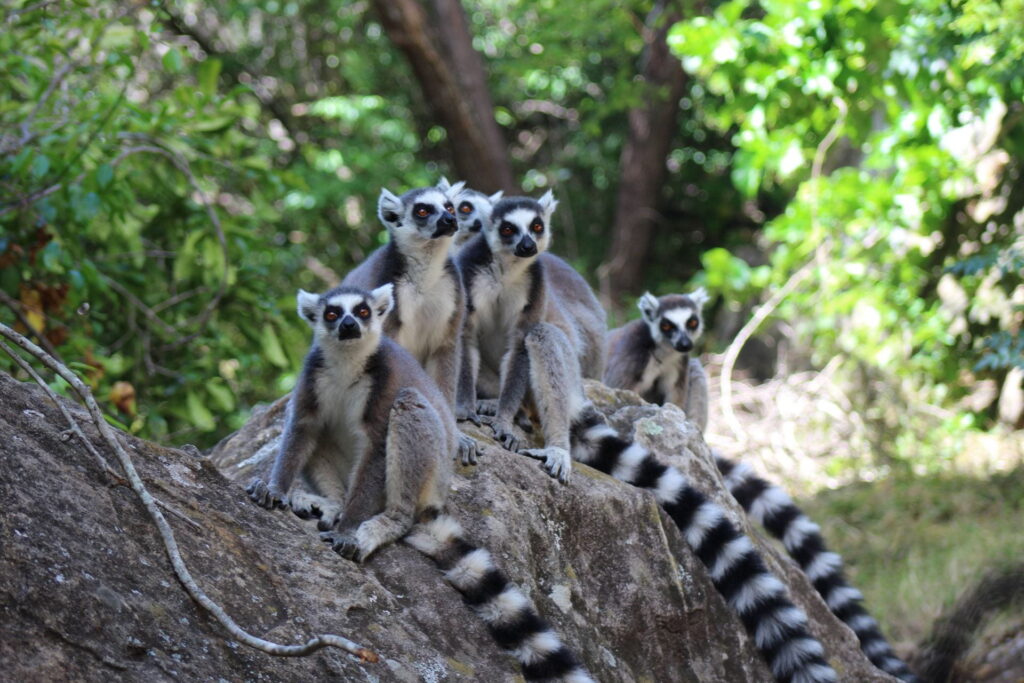Jazz the cook goes off into the forest to cut more firewood wearing a blazer and basketball shorts and comes back with a felled tree over his shoulder. It’s now week two of my research project, the second week of camping in the woods and staring at ducks for five hours a day, and I’m starting to go a bit crazy.
To be honest, it’s a little lonely at camp. No one speaks English, and no one wants to speak French. On a daily basis, I interact with more birds than with humans. But just as I’m sitting by myself under the tarp that protects our cooking fire from the rain, Jazz comes over with his huge smile and his notebook with page after page of English phrases he heard on TV and quickly wrote down to practice later.

Without discussing it, we’ve set up a nightly Malagasy/English lesson as Jazz cooks dinner. As of now, our lessons mainly consist of Jazz picking things up around the campsite kitchen, saying its name in English, and me nodding along and adding the name in Malagasy if I know it.
“Saucepan! Jug! Firewood!” he would exclaim. Today as we sat picking gravel and chaff out of the rice before cooking it, we moved on to complete sentences.
“I don’t drink beer,” he said while barely containing a laugh, but his sideways smile gave himself away immediately. The other technicians at camp try their best to talk with me, but there are always times when both of us end up shaking our heads and looking away with a laugh, our mutual sign that neither of us understands.
I oddly have so much downtime here and nothing really to work on. No classes, no homework, no cellphones. Just one notebook quickly filling up with pochard data and the other that I spend hours a day writing in. I haven’t had nothing to do like this since elementary school, maybe even before that. Before, every waking moment was filled with homework, piano lessons, volleyball, orchestra.
Sometimes I worry I’m not enjoying my time here enough. When else will I get the chance to study endangered birds at the Peregrine Fund research camp in a remote forest of Madagascar? Other times I worry I’m not working hard enough. I’ve gotten used to the moramora way of life. We go out to watch the birds first thing in the morning but when we get back for lunch, we sit around for the rest of the day, the technicians chatting by the fire for hours or watching TV in the main cabin.
Needless to say, time passes very slowly in the forest. Today, it took over two hours to hike to the lake where I would be making observations. It had been over a month since anyone had last visited the lake, and the cleared trail had been reclaimed by the forest. Thankfully Eugene, my guide and encyclopedia for bird calls, had brought his machete that day and was swinging it back and forth like a tennis racket to cut down the unsuspecting fern or vine.

We weren’t disturbing the peace at all with the sound of Eugene hacking through branches or my boots crashing through the leaf litter; the forest was already anything but silent. Insects buzzed monotonously like a landline left off the hook. The raptors hidden by the canopy overhead screeched like a rusty playground swing. The Bemanevika Protected Area isn’t a national park frequently visited by tourists. It’s known mainly by researchers for its impressive diversity of bird species and by hardcore birders who are willing to make the journey and endure life at camp. Bemanevika itself is a town of only fifty people who live off of subsistence farming and raising zebu to sell at the market a day’s walk away. Fifty people whose lives were drastically changed once the Madagascar Pochard was rediscovered right in their own backyard.
The way Lily, my advisor and the director of the Peregrine Fund, tells the story of his discovery is almost comical in how casual and unassuming it is. He happened to be camping with a group of researchers studying reptiles in the region and decided to follow a river to its source. At the end of the river sitting right there on the lake, he found, was a white-eyed duck with dark brown feathers diving for food, the first of its kind seen since the 1990s. He immediately took some blurry, distant photos, but the white of the male pochard’s eye was unmistakable. Taking these photos to Tana, he proved his discovery then traveled right back to Bemanevika to collect the pochards’ eggs and start the first captive breeding program for the species.
For the people of Bemanevika, that’s when the NGOs started moving in. In their wake, they brought with them electricity, livestock, fiberglass canoes, and anything the town requested in exchange for their compliance with the Peregrine Fund’s conservation programs. Which turned out to be a change in their whole way of life. What started out as “don’t hunt animals here” later became “don’t cut down trees here,” “don’t graze your zebu here,” and “don’t burn the grasslands here.” Difficult things to ask for the sake of some ducks.

I think of this whenever I question the importance of all this work to protect a single endangered species. I think of how the measures put in place to conserve one duck have led to the conservation of the entire wetland, and finally to the region being named a Protected Area, the whole forest gaining legal rights against illegal logging and slash-and-burn clearing for agriculture.

As I break through the trees and come to the edge of Lake Matsaborimena, the same lake where the pochards were discovered all those years ago, I settle down for the day with my binoculars around my neck. To pass the time Eugene tells me about his hometown, his vanilla farm that’s being taken care of by friends, and the local kids looking for work, the rainy season where the streets become so flooded people have to get everywhere by boat. He tells me about his work, about recording the first call from a serpent eagle ever heard or the way it swoops down to feed on frogs and chameleons on the forest floor. Sometimes we just sit in silence for hours listening to songbirds perched on the reeds and trying to imitate them from time to time.
In a few days, I’ll start my journey back to Tana. In a few more, I’ll be on my way to the US. Farewell parties, last lunches with our professors, last dinners with my host family, all pass in a blur of exchanged gifts and goodbyes. No one’s asking it, but we’re all wondering what’s next. What comes next after the chaotically wonderful adventure that was the last four months? I know I’ll be back to Madagascar one day, but until then I can’t wait to get back to Boston.
